-
 Bitcoin
Bitcoin $83,891.7312
-1.88% -
 Ethereum
Ethereum $1,578.4275
-3.33% -
 Tether USDt
Tether USDt $1.0000
0.00% -
 XRP
XRP $2.0794
-3.57% -
 BNB
BNB $581.8908
-0.92% -
 Solana
Solana $125.6113
-4.72% -
 USDC
USDC $1.0000
0.01% -
 TRON
TRON $0.2542
2.44% -
 Dogecoin
Dogecoin $0.1532
-3.25% -
 Cardano
Cardano $0.6060
-4.54% -
 UNUS SED LEO
UNUS SED LEO $9.3729
-0.62% -
 Chainlink
Chainlink $12.1807
-2.99% -
 Avalanche
Avalanche $18.8840
-5.20% -
 Stellar
Stellar $0.2359
-2.26% -
 Toncoin
Toncoin $2.8640
-4.28% -
 Shiba Inu
Shiba Inu $0.0...01167
-1.98% -
 Sui
Sui $2.0804
-4.68% -
 Hedera
Hedera $0.1572
-4.15% -
 Bitcoin Cash
Bitcoin Cash $318.3980
-3.27% -
 Litecoin
Litecoin $74.6060
-3.46% -
 Polkadot
Polkadot $3.5135
-3.83% -
 Dai
Dai $1.0001
0.01% -
 Bitget Token
Bitget Token $4.3450
0.02% -
 Hyperliquid
Hyperliquid $15.2439
-4.40% -
 Ethena USDe
Ethena USDe $0.9993
0.01% -
 Pi
Pi $0.6134
-9.10% -
 Monero
Monero $217.7508
1.15% -
 Uniswap
Uniswap $5.1593
-3.72% -
 OKB
OKB $52.0646
-0.19% -
 Pepe
Pepe $0.0...07144
-1.75%
The definition of Bitcoin and how decentralized finance works
Bitcoin, created in 2009, operates on a peer-to-peer network and has a capped supply of 21 million coins, making it a key player in the DeFi ecosystem.
Apr 09, 2025 at 03:29 pm
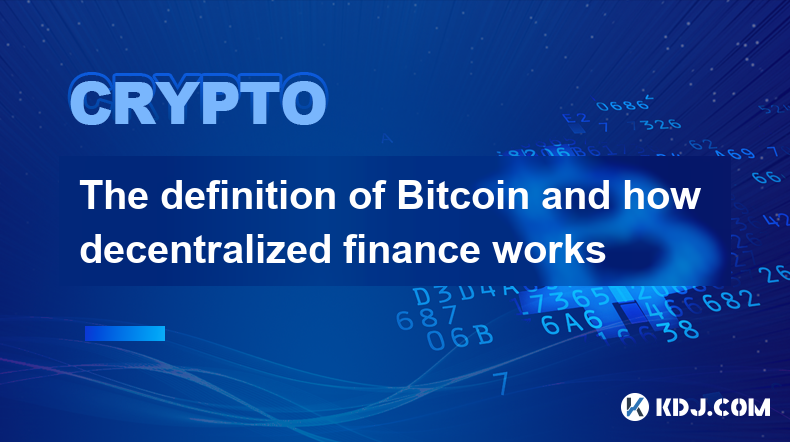
Bitcoin, the world's first decentralized cryptocurrency, was created in 2009 by an anonymous person or group using the pseudonym Satoshi Nakamoto. Bitcoin operates on a peer-to-peer network, allowing users to send and receive payments without the need for intermediaries like banks. The underlying technology that powers Bitcoin is called blockchain, a distributed ledger that records all transactions across a network of computers. This technology ensures transparency and security, as each transaction is verified by multiple nodes on the network before being added to the blockchain.
The value of Bitcoin is determined by supply and demand in the market. Unlike traditional currencies, which are issued by central banks, Bitcoin has a capped supply of 21 million coins. This scarcity, combined with increasing demand, has led to significant price appreciation over the years. Bitcoin can be bought, sold, and traded on various cryptocurrency exchanges, and it is also used as a store of value and a hedge against inflation.
Decentralized finance, commonly known as DeFi, is a financial system built on blockchain technology that aims to recreate traditional financial services without the need for centralized intermediaries. DeFi leverages smart contracts, self-executing code stored on the blockchain, to automate and enforce the terms of financial agreements. This allows users to lend, borrow, trade, and earn interest on their cryptocurrency holdings directly from their digital wallets.
The Role of Bitcoin in Decentralized Finance
Bitcoin plays a crucial role in the DeFi ecosystem, serving as both a store of value and a medium of exchange. While Ethereum is the most popular blockchain for DeFi applications due to its support for smart contracts, Bitcoin can be integrated into DeFi through various methods. One such method is the use of wrapped Bitcoin (WBTC), which is a tokenized version of Bitcoin that can be used on the Ethereum blockchain. This allows Bitcoin holders to participate in DeFi protocols and earn yields on their holdings.
Another way Bitcoin is used in DeFi is through decentralized exchanges (DEXs) that support Bitcoin trading pairs. These platforms allow users to trade Bitcoin directly with other cryptocurrencies without the need for a centralized intermediary. This not only increases the liquidity of Bitcoin but also enhances its utility within the DeFi ecosystem.
How Decentralized Finance Works
Decentralized finance operates on the principles of transparency, accessibility, and automation. At its core, DeFi relies on blockchain technology to create a trustless environment where users can interact directly with each other. Smart contracts play a pivotal role in this process, as they automatically execute the terms of a financial agreement once predefined conditions are met.
To participate in DeFi, users typically need to connect their cryptocurrency wallets to a DeFi platform. This can be done through a web browser or a dedicated mobile application. Once connected, users can access a variety of financial services, including lending, borrowing, trading, and yield farming.
Lending and Borrowing in DeFi
Lending and borrowing are among the most popular DeFi services. In a DeFi lending protocol, users can deposit their cryptocurrency as collateral and borrow against it. The interest rates for lending and borrowing are determined algorithmically based on supply and demand. This process is fully automated through smart contracts, which manage the collateral, interest payments, and loan repayments.
To lend or borrow in DeFi, follow these steps:
- Connect your wallet: Open the DeFi lending platform and connect your cryptocurrency wallet.
- Deposit collateral: If you want to borrow, deposit the required amount of cryptocurrency as collateral.
- Select loan terms: Choose the amount you want to borrow and the cryptocurrency you want to receive.
- Confirm transaction: Review the loan terms and confirm the transaction through your wallet.
- Manage your loan: Monitor your loan and make repayments as needed. If you are lending, you can withdraw your collateral and interest at any time.
Trading on Decentralized Exchanges
Decentralized exchanges (DEXs) allow users to trade cryptocurrencies directly with each other without the need for a centralized intermediary. DEXs use liquidity pools, which are pools of tokens locked in a smart contract, to facilitate trading. Users can add their tokens to these pools to provide liquidity and earn trading fees.
To trade on a DEX, follow these steps:
- Connect your wallet: Open the DEX platform and connect your cryptocurrency wallet.
- Select trading pair: Choose the cryptocurrency pair you want to trade.
- Enter trade details: Specify the amount you want to trade and the type of order (market or limit).
- Confirm transaction: Review the trade details and confirm the transaction through your wallet.
- Monitor your trade: Keep an eye on your trade and manage your positions as needed.
Yield Farming and Staking
Yield farming and staking are other popular DeFi activities that allow users to earn passive income on their cryptocurrency holdings. Yield farming involves providing liquidity to DeFi protocols in exchange for rewards, often in the form of the protocol's native token. Staking, on the other hand, involves locking up cryptocurrency to support the operations of a blockchain network and earn rewards.
To participate in yield farming or staking, follow these steps:
- Connect your wallet: Open the DeFi platform and connect your cryptocurrency wallet.
- Select a protocol: Choose the DeFi protocol you want to participate in.
- Deposit tokens: Deposit the required amount of tokens into the protocol.
- Confirm transaction: Review the terms and confirm the transaction through your wallet.
- Monitor your rewards: Keep track of your rewards and withdraw them as needed.
Frequently Asked Questions
Q: Can Bitcoin be used directly in DeFi protocols?
A: While Bitcoin itself cannot be used directly in most DeFi protocols due to its lack of smart contract functionality, wrapped Bitcoin (WBTC) can be used on platforms built on the Ethereum blockchain. WBTC is a tokenized version of Bitcoin that can be used in DeFi applications.
Q: What are the risks associated with participating in DeFi?
A: Participating in DeFi comes with several risks, including smart contract vulnerabilities, impermanent loss in liquidity pools, and the potential for rug pulls, where developers abandon a project and take users' funds. It's important to conduct thorough research and understand the risks before participating in DeFi.
Q: How can I ensure the security of my funds in DeFi?
A: To ensure the security of your funds in DeFi, use reputable platforms, enable two-factor authentication on your wallet, and never share your private keys or seed phrases. Additionally, consider using hardware wallets for added security and regularly monitor your transactions and positions.
Q: Are there any regulatory concerns with DeFi?
A: Yes, there are regulatory concerns with DeFi, as it operates in a largely unregulated space. Governments and financial authorities are increasingly scrutinizing DeFi platforms for compliance with anti-money laundering (AML) and know-your-customer (KYC) regulations. It's important to stay informed about the regulatory environment in your jurisdiction.
Disclaimer:info@kdj.com
The information provided is not trading advice. kdj.com does not assume any responsibility for any investments made based on the information provided in this article. Cryptocurrencies are highly volatile and it is highly recommended that you invest with caution after thorough research!
If you believe that the content used on this website infringes your copyright, please contact us immediately (info@kdj.com) and we will delete it promptly.
- Gold prices have surpassed $3,300 per ounce, setting a historic high as global markets face heightened volatility.
- 2025-04-16 20:35:12
- Mantra Labs CEO John Mullin Aims to Earn Community Confidence by Permanently Removing the Team's Tokens from Circulation
- 2025-04-16 20:35:12
- Mantra CEO John Mullin Plans to Burn All Team-Held OM Tokens to Rebuild Trust
- 2025-04-16 20:30:13
- BNB Chain Burns $916 Million Worth of Tokens in Latest Incineration Event
- 2025-04-16 20:30:13
- Bitcoin (BTC) Dips to $83k Today as Market Uncertainty Grips the Crypto Space
- 2025-04-16 20:25:13
- Pi Coin Price Has Slipped Nearly 15% Today to $0.6
- 2025-04-16 20:25:13
Related knowledge
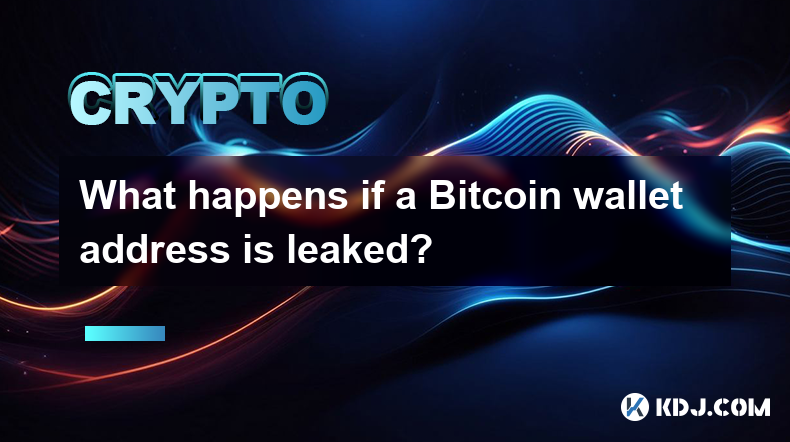
What happens if a Bitcoin wallet address is leaked?
Apr 16,2025 at 02:42pm
When a Bitcoin wallet address is leaked, the implications can be significant, depending on several factors. Understanding the potential risks and how to mitigate them is crucial for any Bitcoin user. This article delves into the various scenarios that can occur when a Bitcoin wallet address becomes public and offers guidance on how to protect your asset...

What are the latest ways to get Bitcoin for free?
Apr 16,2025 at 05:00pm
In the dynamic world of cryptocurrency, Bitcoin remains at the forefront, and many enthusiasts are constantly seeking ways to acquire it without spending money. While the allure of getting Bitcoin for free is strong, it's essential to approach these methods with caution and a clear understanding of the potential risks and rewards. This article will expl...
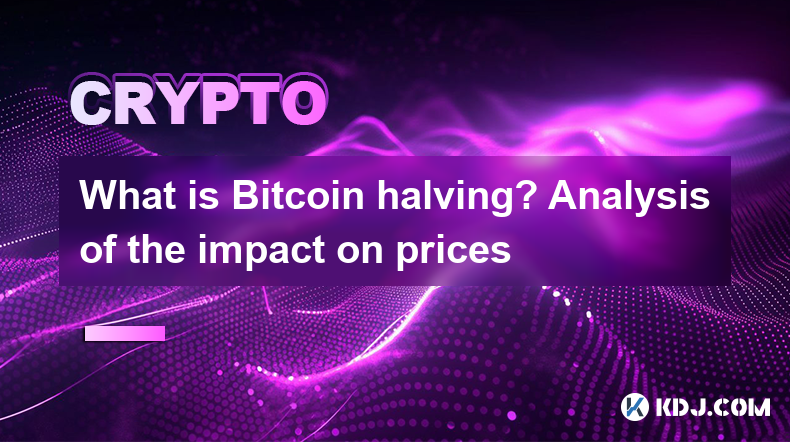
What is Bitcoin halving? Analysis of the impact on prices
Apr 09,2025 at 01:14pm
Bitcoin halving is a pivotal event in the cryptocurrency world that occurs approximately every four years, or every 210,000 blocks. The event is designed to reduce the rate at which new bitcoins are generated, thereby controlling inflation and increasing scarcity over time. During a halving, the reward that miners receive for successfully adding a block...
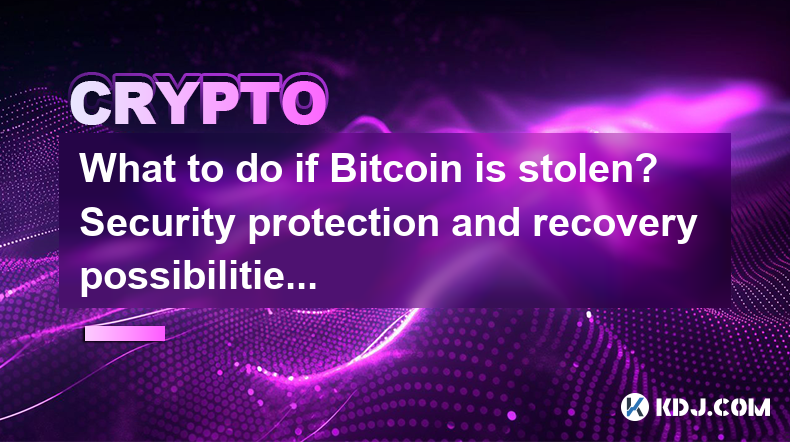
What to do if Bitcoin is stolen? Security protection and recovery possibilities
Apr 09,2025 at 03:42pm
If your Bitcoin is stolen, it can be a distressing experience, but there are steps you can take to protect your remaining assets and attempt to recover your lost funds. This article will guide you through the process of securing your Bitcoin and exploring recovery possibilities. Immediate Actions After Bitcoin TheftThe moment you realize your Bitcoin ha...
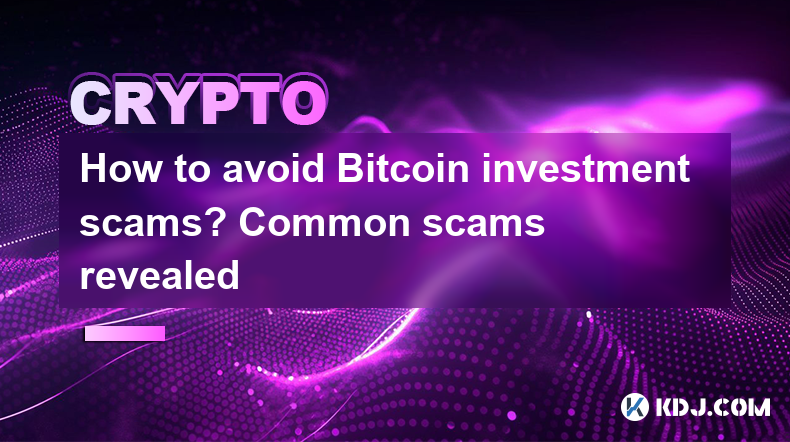
How to avoid Bitcoin investment scams? Common scams revealed
Apr 10,2025 at 05:14pm
Introduction to Bitcoin Investment ScamsBitcoin and other cryptocurrencies have become increasingly popular investment options, attracting both seasoned investors and newcomers alike. However, with the rise in popularity, there has also been a surge in Bitcoin investment scams. These scams can range from Ponzi schemes to fake exchanges and fraudulent in...
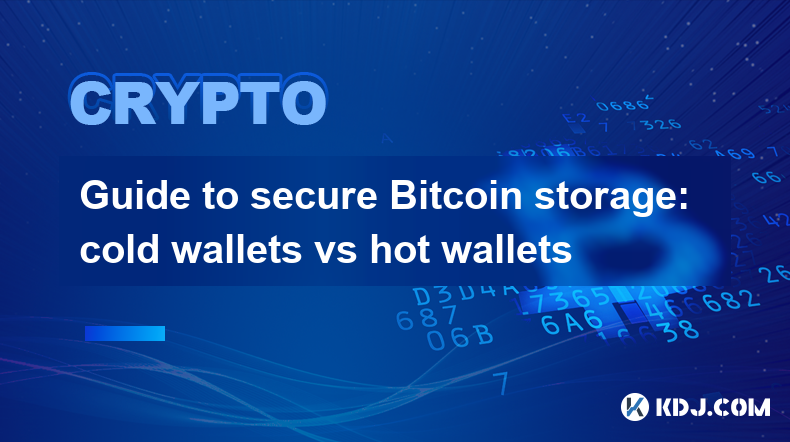
Guide to secure Bitcoin storage: cold wallets vs hot wallets
Apr 11,2025 at 08:42am
Guide to Secure Bitcoin Storage: Cold Wallets vs Hot Wallets When it comes to storing Bitcoin, security is paramount. The choice between cold wallets and hot wallets can significantly impact the safety of your digital assets. This guide delves into the differences between these two types of wallets, their respective advantages and disadvantages, and how...

What happens if a Bitcoin wallet address is leaked?
Apr 16,2025 at 02:42pm
When a Bitcoin wallet address is leaked, the implications can be significant, depending on several factors. Understanding the potential risks and how to mitigate them is crucial for any Bitcoin user. This article delves into the various scenarios that can occur when a Bitcoin wallet address becomes public and offers guidance on how to protect your asset...

What are the latest ways to get Bitcoin for free?
Apr 16,2025 at 05:00pm
In the dynamic world of cryptocurrency, Bitcoin remains at the forefront, and many enthusiasts are constantly seeking ways to acquire it without spending money. While the allure of getting Bitcoin for free is strong, it's essential to approach these methods with caution and a clear understanding of the potential risks and rewards. This article will expl...

What is Bitcoin halving? Analysis of the impact on prices
Apr 09,2025 at 01:14pm
Bitcoin halving is a pivotal event in the cryptocurrency world that occurs approximately every four years, or every 210,000 blocks. The event is designed to reduce the rate at which new bitcoins are generated, thereby controlling inflation and increasing scarcity over time. During a halving, the reward that miners receive for successfully adding a block...

What to do if Bitcoin is stolen? Security protection and recovery possibilities
Apr 09,2025 at 03:42pm
If your Bitcoin is stolen, it can be a distressing experience, but there are steps you can take to protect your remaining assets and attempt to recover your lost funds. This article will guide you through the process of securing your Bitcoin and exploring recovery possibilities. Immediate Actions After Bitcoin TheftThe moment you realize your Bitcoin ha...

How to avoid Bitcoin investment scams? Common scams revealed
Apr 10,2025 at 05:14pm
Introduction to Bitcoin Investment ScamsBitcoin and other cryptocurrencies have become increasingly popular investment options, attracting both seasoned investors and newcomers alike. However, with the rise in popularity, there has also been a surge in Bitcoin investment scams. These scams can range from Ponzi schemes to fake exchanges and fraudulent in...

Guide to secure Bitcoin storage: cold wallets vs hot wallets
Apr 11,2025 at 08:42am
Guide to Secure Bitcoin Storage: Cold Wallets vs Hot Wallets When it comes to storing Bitcoin, security is paramount. The choice between cold wallets and hot wallets can significantly impact the safety of your digital assets. This guide delves into the differences between these two types of wallets, their respective advantages and disadvantages, and how...
See all articles























































































